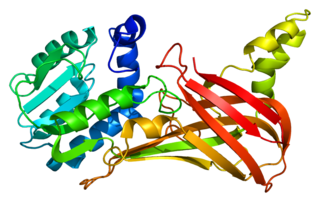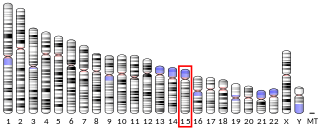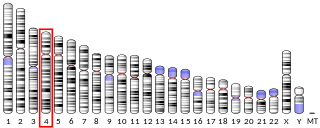
WD repeat-containing protein 3 is a protein that in humans is encoded by the WDR3 gene.

Protein arginine N-methyltransferase 3 is an enzyme that in humans is encoded by the PRMT3 gene.

SLX4 is a protein involved in DNA repair, where it has important roles in the final steps of homologous recombination. Mutations in the gene are associated with the disease Fanconi anemia.

Integrator complex subunit 12 (Int12) also known as PHD finger protein 22 (PHF22) is a protein that in humans is encoded by the INTS12 gene.

Protein FAM134C is a protein that in humans is encoded by the FAM134C gene.

The family with sequence similarity 73, member B, also known as FAM73B, is a human gene.

FUN14 domain containing 1 is a protein that in humans is encoded by the FUNDC1 gene.

Dynactin 5 (p25) is a protein that in humans is encoded by the DCTN5 gene.

CSRP2 binding protein is a protein that in humans is encoded by the CSRP2BP gene.

Mitochondrial methionyl-tRNA formyltransferase is a protein that in humans is encoded by the MTFMT gene.

Coiled-coil domain containing 137 is a protein that in humans is encoded by the CCDC137 gene.

Solute carrier family 41, member 3 is a protein that in humans is encoded by the SLC41A3 gene.

CARMIL1 is a protein that in humans is encoded by the CARMIL1 gene. The gene is also known as LRRC16, LRRC16A, CARMIL, or CARMIL1a.

MIS18 binding protein 1 is a protein that in humans is encoded by the MIS18BP1 gene. The gene is also known as LKNL2, M18BP1, C14orf106, and HSA242977.

DIP2 disco-interacting protein 2 homolog B (Drosophila) is a protein that in humans is encoded by the DIP2B gene. A member of the disco-interacting protein homolog 2 protein family, it contains a binding site for the transcriptional regulator DNA methyltransferase 1 associated protein 1, as well as AMP-binding sites. The presence of these sites suggests that DIP2B may participate in DNA methylation. This gene is located near a folate-sensitive fragile site.
Ankyrin repeat and sterile alpha motif domain containing 4B is a protein that in humans is encoded by the ANKS4B gene. The gene is also known as HARP. Ankyrin repeats mediate protein-protein interactions in very diverse families of proteins.

Transmembrane protein 165 is a protein that in humans is encoded by the TMEM165 gene.
Glutamyl-tRNA(Gln) amidotransferase, subunit C homolog (bacterial) is a protein that in humans is encoded by the GATC gene. The gene is also known as 15E1.2 and encodes part of a Glu-tRNA(Gln) amidotransferase enzyme.
Family with sequence similarity 104, member A is a protein that in humans is encoded by the FAM104A gene. The orthologous gene in mice is also known as D11Wsu99e.

Chromosome 2 open reading frame 54, otherwise known as Mab21L4, is a protein that in humans is encoded by the C2orf54 gene. The orthologue in mice is 2310007B03Rik.



















